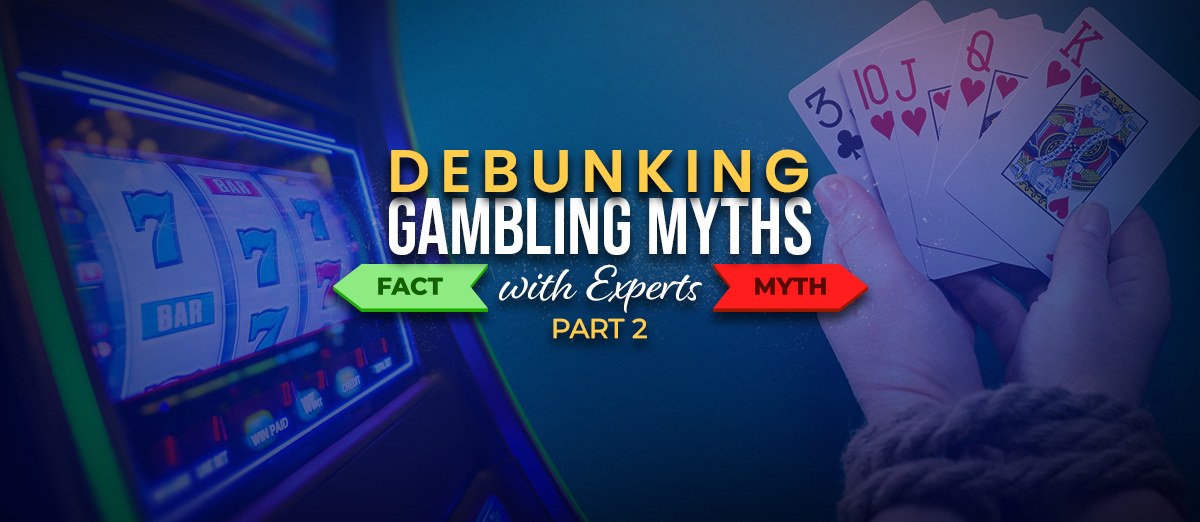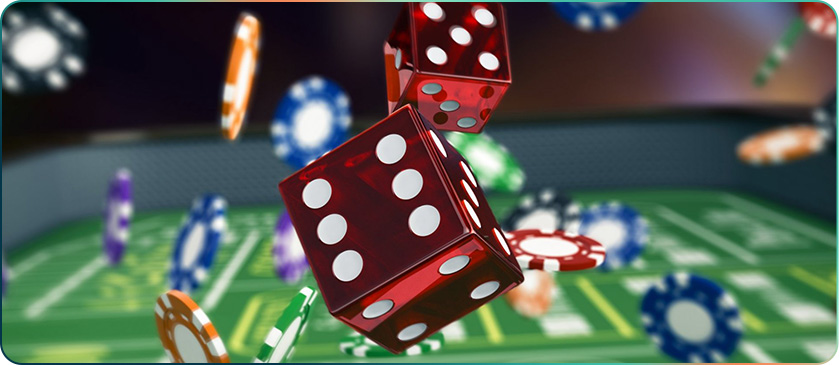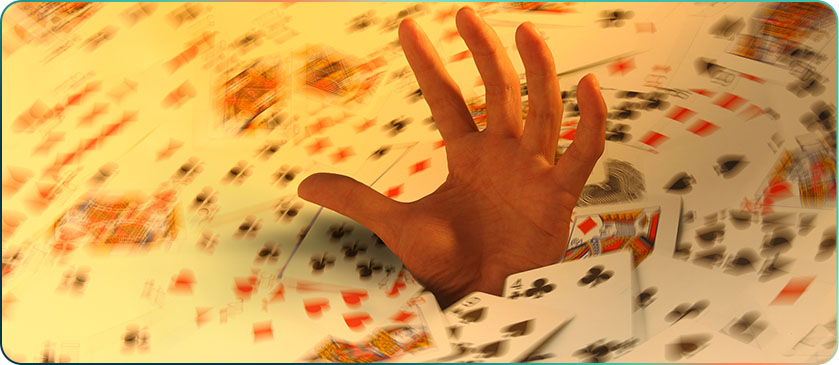Gambling Experts Break Apart Popular Casino Myths and Misconceptions – Part 2

In the glimmering halls of casinos, tales of luck, strategy, and superstitions swirl like a never-ending game of chance. But are these stories mere myths, or do they hold some hidden truths? Our quest continues from Gambling Myths Part 1 where we debunked 7 of the most popular casino myths.
To assist us in our pursuit of knowledge, we've assembled an elite myth-debunking squad, each with their own unique expertise.
First, we have Tadas Peckaitis, the esteemed poker genius whose analytical mind is more than prepared to take on the myths surrounding card counting and gambling strategies. Next up, we welcome Catalin Barboianu, our gambling mathematician extraordinaire. His keen insights and logical deductions will shed light on the statistical truths behind the myths we encounter. Lastly, we introduce Catherine Lyon, a remarkable advocate for responsible gambling who has triumphed over the clutches of addiction.
So, fasten your seatbelts and prepare for a voyage of discovery into the heart of even more gambling myths.

Myth 8: You Can’t Be a Successful Poker Player If You Don’t Bluff a Lot
Tadas: False. There is a big misconception about poker players and what they do compared to what is seen on televised events and big shows. Since the media loves huge bluffs and display these hands with a much higher frequency than it happens, it may look that the only way to win is to constantly bluff and put your opponent on the line in every second hand you play.
However, the truth can’t be further from this.
Quite the contrary, bluffing too often could be a bigger problem than not bluffing enough, especially when starting out. Of course, you will still need to bluff in favorable situations, or your game will become too predictable, but it is a myth that you need to bluff a lot to win the games.
The most important part for you is to select strong starting hands, which will instantly give you a big range advantage against most players and put you in a good position to win many pots without any need to over-bluff in these situations. If you select the correct hands pre-flop, you will never need to artificially force the action.
Switching gears to the realm of poker, I've discovered that playing at lower stakes often involves encountering recreational players who hesitate to fold even when holding marginal hands. Bluffing against such opponents can prove futile, akin to a suicidal move. Instead, I've found success in playing assertively when I hold a strong hand, capitalizing on their errors.
However, it's crucial to note that as one progresses to higher stakes and faces skilled players, bluffing becomes an essential part of the game. Balancing one's ranges against tougher opponents necessitates occasional bluffs. Nonetheless, this should not be misconstrued as a license to go overboard and engage in reckless bluffing merely for the sake of excitement. A measured and strategic approach remains paramount.
Myth 9: People with Gambling Problems Are Easy to Identify
Catherine: False. Indeed, it is an undeniable reality that identifying a person struggling with problem gambling is a challenging task. Unlike alcoholics or drug abusers, whose external actions often reveal their issues, those caught in the grip of gambling addiction do not exhibit such obvious signs. This addiction operates without the need for any substance, earning it the label of a "silent and hidden addiction."
For me personally, the initial red flags of problem gambling appeared in the form of mood swings and obsessive behaviors. It was my husband who first noticed these subtle changes, signaling that something was amiss.
Although I managed to conceal my gambling habits from him for a considerable period, my increasingly extreme mood swings, attitude, and behaviors gradually betrayed the turmoil within. If I had a bad day of gambling and lost money, I would react by becoming angry or engaging in arguments with my spouse.
As the gambling addiction tightened its grip, anxiety and mild mania crept into my life, compelling me to seek ways to return to gambling and recoup my losses. Regrettably, I began hiding household funds from my spouse to fuel my addiction, leading to unpaid bills and late notices piling up in the mail. It was during this distressing period that I came to acknowledge and confront the reality of my gambling problem.
Myth 10: Online Gambling Is Rigged
Tadas: False. One of the most common myths about online gambling is that live casinos are rigged, and players get scammed of their money. While it might look like that after an extended losing stretch, this is an entirely false statement, so let’s look into the main facts to see why this is nothing more than a myth.
First and foremost, casinos do not need to rig the games to win. Every slot, blackjack game, or roulette table has a house edge, meaning you will lose in the long run, no matter what.
This is true for every other game in online casinos, so the site is making a profit on volume, so risking that to rig a game and scam a specific player would be very costly for them.
For example, on an American roulette spin, the house has a 5.26% edge no matter what you bet on. If you place a $100 bet, you will lose that 5.26% or $5.26 in the long run, so the casino takes it as a profit. Of course, you can win any given bet or even a series of bets at any time, but if you play long enough, the casino will take its share, and nothing can be done about it.
Since casinos have an advantage and a higher chance of winning than losing in any given situation, you will more often get extended periods of bad luck than a hot streak, and this is why it might seem that games are rigged while they are completely fair in most cases.
I say in most cases since we have to mention licensing part here. If you play on an unregulated online casino, these sites can do what they want. While it is unlikely that even they would rig the games, there is certainly a theoretical probability of that happening, so you should stick to properly licensed sites that respect the gambling regulation of your country.
All licensed casinos must go over expensive and lengthy procedures to get that license. After that, they are constantly checked by regulating bodies and even third-party auditors for randomness in their games. On top of that, they are monitored for other malicious practices and can easily lose their license if something is even remotely questionable, so online casinos play by the book.
At the end of the day, the most important fact is that it is not worth it for them to rig the games since they are making so much money fair and square that risking such business does not make any financial sense for them.

Myth 11: If You’re on a Losing Streak, You’re Due for a Win
Catalin: False. No law of compensation for bad luck applies in real life, where randomness governs. In gambling, the outcomes of the games are determined randomly, except for biased or fraudulent games. This entails that any specific outcome has the same probability of occurrence in any new draw or spin, and this probability does not depend on the previous outcomes since each draw is independent of another.
If outcomes are generated by the same machine, we may say that they are physically related, but they are statistically independent. Being physically related does not impact their randomness.
If you roll a die several times knowing that the probability of a specific number coming up is 1/6, you may expect to see this happening in about 1 out of six rolls, but no physical law excludes the possibility of that number not showing in, say, 10,000 rolls, although it is unlikely that you will see such event during your lifetime.
Probability does not balance the physical outcomes. It is just an infinite average that we take as the mathematical measure of the physical possibility. The higher the number of rolls, the more the relative frequency of a number coming up is approaching 1/6, says the Law of Large Numbers, but that does not entail any balance or compensation over finite intervals of rolls.
Believing in such compensation is a well-known and dangerous gambling cognitive distortion called The Gambler’s Fallacy (or the Monte Carlo Fallacy). For resisting it, you should imagine every new draw or spin to be your first and forget about previous outcomes.
Imagine a player in roulette betting repeatedly on red. Whatever long the losing streak, the probability for a red number to occur at the next spin is the same as in the previous spin (slightly less than 50%). If the player chose to bet alternatively on bet and black or just randomly between the two colors, the probability for a red would remain the same and perhaps the player would not have been so concerned about the losing streak and would not have expected any compensation to that. Randomness does not owe us anything.
Myth 12: Problem Gambling Isn’t a Problem If the Gambler Can Afford It
Catherine: False. Through personal experience, I've come to realize that being a problem or addicted gambler is an unaffordable endeavor. It's not a matter of having the financial means to gamble or deeming a certain amount of money as risk-worthy. The crux of this addiction lies in the disease itself and the vicious cycle it perpetuates, especially when it reaches the point of uncontrolled gambling.
Trust me when I say that if you continue down the path of gambling addiction, the money will inevitably dwindle away, sooner or later. A poignant illustration of this occurred in 2017 in Las Vegas during a concert.
A tragic Las Vegas shooting unfolded on October 1, during a concert, as the perpetrator fired rifle rounds from a hotel room on the 32nd floor, targeting innocent concertgoers. It was later revealed that the shooter had lost an enormous sum of money, having stayed at the renowned hotel while participating in a video poker tournament. Despite initial claims of wealth and ability to afford extensive gambling, news outlets subsequently reported that the individual had faced significant financial woes stemming from years of compulsive gambling.
For individuals like myself, who couldn't afford to sustain the level of gambling I indulged in, the repercussions were financially devastating for both my spouse and me. As my compulsive gambling escalated, it eroded our financial stability, leaving us with fewer resources for our retirement and future aspirations. The more I risked through this compulsive behavior, the bleaker our financial outlook became. Recognizing the gravity of this reality is essential in breaking free from the clutches of gambling addiction and safeguarding our financial well-being and future prospects.

Myth 13: Betting Systems Can Guarantee You’ll Win at Games Like Roulette
Catalin: False. If that were true, more and more players would come to use such systems and thus the casinos would eventually cease to exist. But this did not happened and the house edge for a game is ensured whatever systems and strategies are used by players. Winning ultimately depends on luck and chance and these factors cannot be pulled out from games of chance; they are in the nature of the game.
No betting system guarantees a win or a profit, on either short or long term, not even optimal strategies (for games that are suitable for such strategies). Optimal strategies can at most optimize the expected value of a bet – that is, they provide the required action in certain circumstances, which maximizes the profit and minimizes the loss over the long run.
Such strategies work for games like blackjack and can reduce the house edge from a standard 1.5% – 2.7% (depending on the game version) down to 0.5%, but as you see, it still remains positive. There are specific configurations in which an optimal strategy can provide a positive expected value for a bet, but this does not mean that it guarantees a win even in the long run because there are other configurations as well that have negative expectations associated, and all is balanced so that to have a constant house edge.
This does not apply to roulette, where the expected value of a bet remains constant whatever the betting system used (2.70% or 5.26% for the European and American versions, respectively). Instead, a static betting system can increase the probability of winning at a spin, but at the cost of a low profit rate or high possible loss. Progressive systems such as martingale are mathematically designed to come to a win eventually, but the losing streaks counts in the equation, as they can deplete your bankroll.
In roulette and other casino games as well, all these statistical and financial indicators are balanced: one advantage is counterbalanced by one or more disadvantages, so as the house edge to remain constant.
Myth 14: Gambling Is Only a Problem When You Lose Every Time
Catherine: False. Once you find yourself entangled in the throes of gambling addiction, the consequences become all too apparent, and your losses start to outweigh any fleeting wins.
The odds are against you, and the more you engage in gambling, the higher the likelihood of losing becomes. This relentless cycle of gambling addiction takes hold, compelling you to chase your losses after every defeat and even after a fleeting victory, leading you to gamble until not a single penny remains.
For a significant portion of my life, I was firmly caught in the clutches of this addiction. There's a complex interplay of chemical, emotional, and physical factors at play in this struggle. Each time I indulged, I could feel my body releasing dopamine when gambling, enticing me to do it more frequently and for prolonged periods.
Despite experiencing loss after loss, I persisted until every last penny was gone, often increasing my bets and taking greater risks in an attempt to recoup what I had lost. Little did I know, underlying undiagnosed mental health issues further exacerbated my poor choices in gambling, leading me to make these detrimental decisions multiple times a day.
Whether you find yourself on the winning or losing end of a gambling session, the outcome remains the same: the insidious grip of this disease drives you to chase after your money, ensnared by unhealthy thought patterns and impulses. Understanding the impact of these forces is crucial in breaking free from the cycle of gambling addiction and seeking the necessary help and support to reclaim control over your life.
Myth 15: The More You Gamble, the More Likely You Are to Win
Catalin: False. The truth of this sentence depends on the meaning we assign to ‘win’. If we talk about ‘win’ as a winning event (say you hit a winning combination at slots), the sentence is true; probability of winning increases with every new bet or spin. But if we talk about ‘win’ as overall profit, the sentence is false. Whatever bet you place, over the long run you overall profit comes to approach the expected value of your bet, which is negative in any game for the non-strategic play.
Even in those games allowing strategies that optimize the expectation, the overall profit over the long run will align with the house edge, since you cannot encounter only those situations that are favorable for a positive expected value. This is how the statistics laws work in gambling – cumulatively and not isolately. Thus, the more you gamble, the more likely is for you to come to a negative balance of your profit.
Final Thoughts
Our journey through gambling myths has been eye-opening and enlightening, thanks, especially to our renowned experts. We hope that by debunking these misconceptions, we can encourage a more informed and responsible approach to gambling.
Remember, gambling is a captivating mix of chance and thrill, but understanding its realities and potential pitfalls is crucial to ensuring a safer and more enjoyable experience. Stay tuned for more enlightening adventures as we continue to explore the captivating gaming world in the future.






